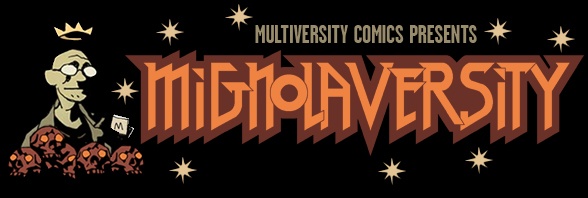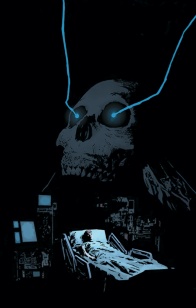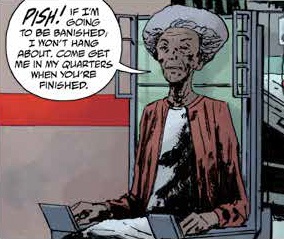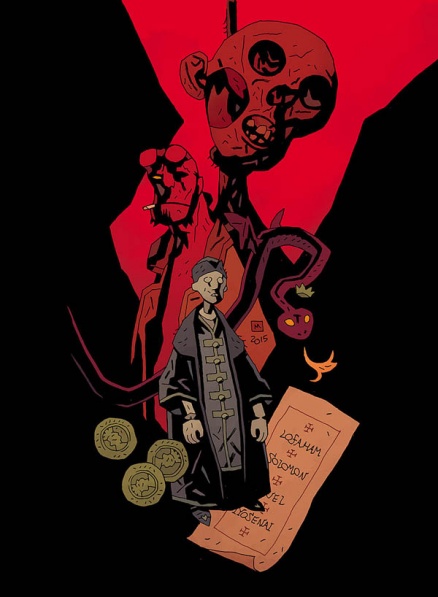
Things were left in a grim state last issue, but perhaps the B.P.R.D. has found a powerful ally in their former foe, Mr. McWhirter of the Oannes Soiety.

Written by Mike Mignola and John Arcudi
Illustrated by Laurence Campbell
Colored by Dave Stewart
Lettered by Clem RobinsThe BPRD send their two strongest champions to assist in the destruction of the Black Flame, and with the help of their newest ally’s incredible weapon, things are finally looking up.
Mark: I don’t know about you, but I’ve begun to associate a feeling of dread with reading “B.P.R.D. Hell on Earth”. Not in a bad way, but so many of the characters are in perilous situations, and I’m getting really nervous for them.
Brian: I agree – this feels like the place in the “Hell on Earth” saga where literally anything can happen. This issue, in particular, felt like everything we know about these characters is poised to change. Let’s start broadly: what’s your overall impression of the issue?
Mark: I’m getting a lot of the same feelings I had when “Plague of Frogs” drew to its end, especially that stuff with Liz having visions of a horrible and unstoppable future. In “Hell on Earth” it’s Fenix having these visions with her sister as her guide. That and having WcWhirter in the mix, there’s a bit of déjà vu in there. But this is still unmistakably “Hell on Earth”. Back in “King of Fear”, the destruction was like nothing we’d ever seen before. It was so far divorced from what we’d ever known, it seemed a long way off. Now these future visions are veering towards being imminent. This story cycle is called “Hell on Earth” for a reason, after all.
The other aspect that I really enjoyed was that sense of story threads being pulled together. There’s long-term stuff that’s been waiting in the wings for a while, and it’s satisfying to see those elements come into play again.
Brian: Yeah, this feels like the third act of a film, where all the pieces are on the table, and the final battle is about to begin. Of course, we’ve been in the third act of “Hell on Earth” for some time now, but I think you understand what I mean. Storylines are converging, and things are about to get real.
Let’s talk about McWhiter’s weapon for a second – using, essentially, sad ghosts to take down the monsters is a horrifying, if seemingly quite effective, technique. Is there precedent for anything like this in the Mignolaverse?
Mark: Not specifically this, no. I mean, we’ve seen instances where human spirits are harnessed for power, such as in “Witchfinder: Lost and Gone Forever”. The Black Flame himself draws power from all life in New York, and we’ve seen time and time again the Ogdru Hem spirits have given themselves physical form by consuming human life.
But weaponizing human souls against the Ogdru Hem, that’s new. Although, Vril has always been a powerful weapon against the Ogdru Hem, and Vril gave life to the Frankenstein Creature, and to the Ogdru Jahad themselves. Maybe there’s a bit of Vril in all human souls, and by harvesting them in the thousands, McWhirter has enough ammunition to do real damage.
Honestly, I have no idea. I’m probably talking nonsense. Do you have your own theory?
Brian: Not really – if you read between the lines of the conversation that he and Johann have, it seems that the souls are sad anyway – it isn’t like weaponizing them hurts them more than being dead already does – and so, given the choice to help save the world or not, especially if it doesn’t affect how they feel, it seems like they are (somewhat) willing participants.
The simplistic answer is that the soul is what is left from a life after death, and the Ogdru Hem are, more or less, death incarnate. So, life defeats death. That seems far too simplistic for this story, though.
Mark: I wonder about that, actually. In “B.P.R.D.: The Ectoplasmic Man”, Johann met a demon that consumed the souls of the dead. Johann thought this was a sick perversion, because by consuming these souls they were robbed of an afterlife. They were simply gone. It was this confrontation that led Johann to become a B.P.R.D. agent.
Continued belowI imagine McWhirter’s weapon is similar, if not the same. And Johann’s certainly aware of their pain, but he can’t feel it like he used to. I guess he sees the need for it, though he certainly expresses regret.

Man, the further we get into this arc, the more I’m convinced Johann’s not going to survive “Hell on Earth”.
Brian: I guess the real question is this: has he even survived until now? Is this really ‘surviving?’
Not only has he lost his body, he’s lost his unique abilities, and he’s lost any sense of humanity that he once had. He is literally trapped in a machine that destroys. He’s a soldier, and so he’s fine with the arrangement for now, but I can’t imagine that he would be too interested in carrying on like this after the war – if there is an after the war.
Mark: The Sledgehammer armor does kinda force him to confront his mortality, that’s for sure.
OK, I’ve gotta talk about other dead people here, namely Panya and Iosif. I’ll kick off with Panya, because she’s a character that’s always baffled me. I’m suspicious of her, but then at other times, I get the feeling she really cares. Like with Fenix. Somehow, she’s taken a liking to the ‘ragamuffin’ as she calls her, and it doesn’t seem like an act to me. But she’s definitely holding back too. I mean, what’s with the letter she got? I honestly have no idea what that’s about. I didn’t recognize the symbol or anything.
Brian: Those symbols certainly don’t mean anything to me, so the letter had me totally baffled. But I agree that Panya has a genuine concern for Fenix, and I’m not really sure why. Perhaps she feels like Fenix and her are similar in some way, and so maybe she reminds her of a young version of herself? Again, that seems too simplistic for this story.
I don’t see why Panya would benefit from holding back, do you? This is a time when literally all hands must be on deck, and I can’t imagine a benefit to her holding out on the group.
Mark: I have a feeling she knows much more than she’s telling. I used to think she was concealing it for her own ends, but now I’m beginning to wonder if she’s keeping things from them to spare them from fighting something they can’t change.
Brian: That could be the case, but I also could see a situation where, due to whatever reason, she actually has less control of her powers than before, and she’s afraid to admit that, too. Her character is so inscrutable that it is hard to get a read on any part of her beyond the surface.
Mark: Yeah, I can’t see to get a read on her at all. She’s all smoke and mirrors.

One character I have a better handle on is Iosif, though. I like him more and more all the time. And frankly, I think he’s one of the more trustworthy characters in the series. He only played a small role in this issue, but it was a moment that further cemented him as a favorite of mine.
Brian: You took the words right out of my mouth – compare Iosif of today to Iosif of “B.P.R.D.: Russia,” and be amazed. His dedication and loyalty are really so, so different than how he was initially presented. Of course, I often forget that he has Varvara on his desk, but aside from that, I can’t really think of anything that he’s done in recent memory to shake the foundation of trust that he has built up. His friendship with Johann is one of my favorite things about “B.P.R.D.”
Mark: Johann is certainly his closest bond―there’s no one else really that can relate to Iosif’s life experience better―but he’s also great with Kate Corrigan and Carla Giarocco. And frankly, Varvara’s a monster. It’s easy to forget because we see her in these flashbacks with Trevor Bruttenholm and she’s sympathetic… but I still remember what she did to Iosif when he was alive, and gleefully too. For me, the tragedy is how that hatred of her is eroding Iosif. It’s a weakness that will eventually break him.
Continued belowBrian: Let’s talk about Laurence Campbell for a few minutes. I think I speak for both of us when I say that Campbell has grown in leaps and bounds since coming on the book. He really shines in the quiet moments, and manages to take even moments that are bombastic (like a cannon firing DEAD SOULS at Ogdru Hem!) seem personal and intimate. If James Harren is the king of the insane action sequences, Campbell is the master of the internal struggle.
Mark: True. He does a lot of long-shot panels that say quite a bit about the characters. Like with Panya by Fenix’s bed. He could have gone for a close-up and shown her concern, instead he went for a distant panel and removed the background. So it creates this space of isolation, where all that exists in the world is Fenix and Panya. I really like how he uses composition in a very character-focused way like that.

Brian: In particular, I felt that his Panya was exceptional in this issue. She’s a character that fades in detail depending on who is drawing her, and his Panya is especially weary and worn, but with a quiet dignity that is sometimes missing from her portrayal. His Panya looks almost stately at times, but, you know, a mummy.
Mark: I absolutely agree. He seems to have a natural affinity for the character.
And god damn it, I feel like an idiot for not realising sooner, but that message to Panya was written by Agent Howards. He was writing it in the last issue.
Also, and this is something from last issue as well, I have to mention Campbell’s approach to scale. This is something that comes from the writing too, but there was a scene that began with close ups, tight on Johann’s face and Liz’s cigarette. As the scene continues, we pull further back, showing the full interior of a B.P.R.D. helicopter, then having the helicopter land on the S.S.S. helicarrier, and then finally having Liz jump off and see the first Ogdru Jahad. The scene set up a sequence of scale comparisons so that final double-page spread of the Odgru Jahad had maximum impact. There was really strong visual storytelling at work there from both Arcudi and Campbell.
Brian: Campbell is really making a name for himself as a master of storytelling, which is interesting, because I think most people associate him still with covers. Those two talents don’t always translate, and Campbell is able to go back and forth with ease.
Mark: Yeah. And I liked the way he handled the quieter moments in this issue, like the moment of bonding between Andrew Devon and O’Donnell’s carer (I’m sorry, her name escapes me), and the conversation between Liz, Johann, and McWhirter. Given the way this issue ended, I don’t think there’ll be much quiet in the rest of this arc.
The navy is gone. Totally gone in just a few seconds. And McWhirter’s weapon is at the bottom of the New York Bay. And the Black Flame is waiting. It’s time for a rematch between Liz and the Black Flame. Given their last encounter in “The Reign of the Black Flame”, I have somewhat of an idea what to expect, and it’s not good. I don’t think for a moment that Liz and Johann are going to win this one. And I think it’s going to make Iosif desperate enough to do something really, really stupid…
Brian: Sadly, I think you’re right. Things don’t look good for the Bureau, but I also don’t know if McWhirter’s weapon is necessarily lost. Perhaps while Liz engages, Johann could rescue it? I don’t know, but I don’t see this ending without a serious casualty.
Anything else you want to add before we grade?
Mark: No, let’s get to grading. This tickled my nostalgia for “Plague of Frogs” quite a bit, but ultimately the last few pages when McWhirter and the navy were lost in one fell swoop was what really did it for me. Maybe I’m evil. I’m giving this one an 8.
Brian: An 8 sounds fair to me.
Final verdict: 8.
For those that don’t know, there’s also a short “Hellboy in Hell” story in “Dark Horse Presents” #16 out today: “The Exorcist of Vorsk”. Check it out.







